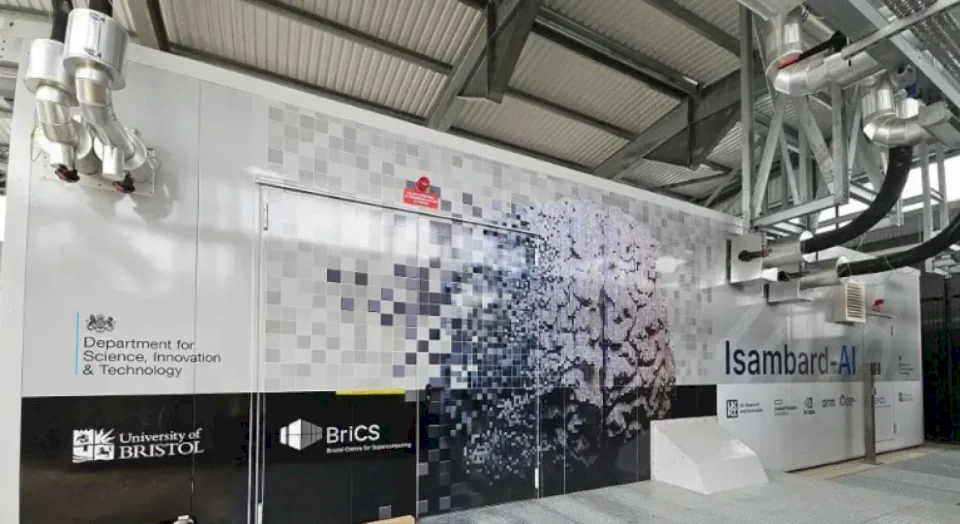
UK Launches Its Most Powerful AI Supercomputer in History
SadaNews - The United Kingdom officially launched "Isambard-AI," the most powerful locally developed supercomputer for artificial intelligence, last Thursday. Located in the supercomputing center in Bristol, this machine represents a strategic investment of £225 million in public infrastructure for advanced computing, providing a strong boost to innovation in health, agriculture, environment, and public services.
Super Speed and National Ambition
"Isambard-AI" consists of over 5,400 "Grace Hopper" GH200 chips produced by Nvidia, delivering over 21 exa-flops of performance, equivalent to the output of 100,000 laptops working in one second. This makes it the fastest AI supercomputer in the UK and the eleventh in the world.
However, its strength lies not just in performance but also in efficiency and sustainability. Thanks to its liquid cooling system, the machine operates with up to 90 percent energy efficiency compared to air cooling, relying entirely on carbon-free electricity. The facility was designed in a modular way, reducing construction emissions by 72 percent, with the ability to reuse heat generated to warm adjacent buildings.
Accessible Computing for All
"Isambard-AI" is available for public use through the "AI Research Resource - AIRR" platform, which also includes the "Dawn" supercomputer at the University of Cambridge. The British government aims to increase public computing capabilities twentyfold by 2030.
The significance lies in the fact that access to these capabilities is no longer exclusive to giant corporations but is also available to academics, small and medium enterprises, and the public sector. Practical applications start from the field and end in hospitals, including current uses for early disease detection in livestock: AI is utilized to analyze continuous video footage to detect symptoms of mastitis in cows. It is also aimed at improving cancer diagnosis accuracy by analyzing biases in skin cancer detection applications, especially on darker skin, and enhancing AI models.
Applications also include video analysis to predict human movement in projects ranging from supporting Alzheimer's patients to anticipating behavior in protests. Additionally, it aids in biomedicine and speeding up medical examinations by assisting in MRI image analysis, developing new drugs, and modeling complex proteins.
Professor Simon McIntosh-Smith, director of the computing center at the University of Bristol, asserts that the machine's capabilities extend to climate research, materials science, and robotics.
Towards "AI Sovereignty"
"Isambard-AI" is a cornerstone of the UK's strategy to achieve "digital sovereignty," meaning the ownership of necessary infrastructure for developing and using artificial intelligence locally without relying on external computing services.
The roadmap includes launching new supercomputers in Edinburgh and expanding "AI Growth Areas" to enhance private investments.
The project was executed in less than two years, a very short period compared to the global average for building similar data centers. This is attributed to the modular design, parallel procurement, and the use of pre-fabricated units, making it an effective model for rapidly and efficiently implementing advanced infrastructure.
Ethics of Use and Equal Opportunities
Despite its significant capabilities, researchers emphasize the importance of transparency and ensuring equitable access. According to Professor Dima Daman: "One concern regarding AI is that it could be owned by a limited group of people." Thus, public investment in this area is a crucial step toward involving everyone in the technology's future. It is also essential that AI decisions, especially in sensitive areas like health and safety, are interpretable and understandable.
The machine opens opportunities for ambitious national projects, including "BritLLM," a large language model supporting both English and Welsh, and the "Nightingale AI" project, which uses data from the National Health Service (NHS) to develop new diagnostic tools. The University of Bristol has also launched a new master’s program in artificial intelligence to empower the next generation of scientists.
"Isambard-AI" is not just a supercomputer; it is a strategic step towards building a data-driven and information-led future. In a time when advanced research needed external computing resources, British researchers, government entities, and businesses can now rely on a national infrastructure that is exceptionally intelligent, fast, and efficient.

Birdwatching Tourism: Pleasure, Excitement, and Unexpected Scientific Discoveries

Dopamine Boosting and Attention Weakness: Beware of Digital Drugs Inside Your Phone

انطلقت منذ 20 عاماً.. ما لا تعرفه عن منصة "روبولوكس"

India Offers Tax Breaks Until 2047 to Attract Cloud Computing Giants

Do You Write To-Do Lists by Hand or on Your Phone? 9 Traits Distinguishing the First Group

Developments in the Health Condition of Actress Susan Badr

How Artificial Intelligence Steals Our Faces and Our Money?

